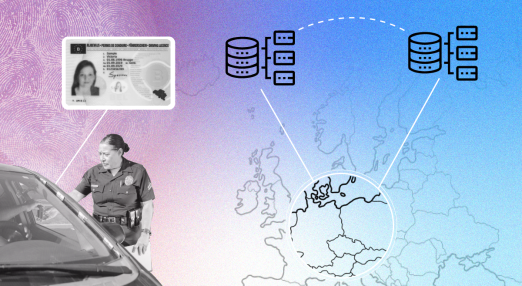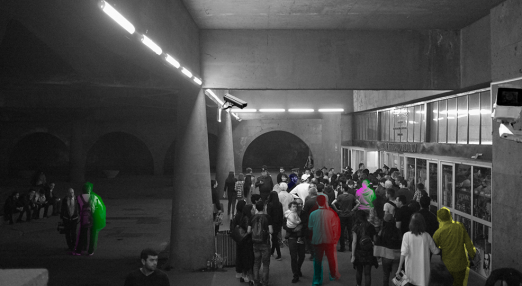Highlights
Filter resources
-

Position Paper: New EU law amplifies risks of state over-reach and mass surveillance
The EDRi network published its position paper on the proposed Regulation on automated data exchange for police cooperation (“Prüm II”). The European Commission’s Prüm II proposal fails to put in place vital safeguards designed to protect all of us from state overreach and authoritarian mass surveillance practices. In the worst case scenario, we may no longer be able to walk freely on our streets as the new law would treat large parts of the population as a criminal before proven otherwise.
Read more
-

The AI Act: EU’s chance to regulate harmful border technologies
The AI Act will be the first regional mechanism of its kind in the world, but it needs a serious update to meaningfully address the profileration of harmful technologies tested and deployed at Europe’s borders.
Read more
-

The European Parliament must go further to empower people in the AI act
Today, 21 April, POLITICO Europe published a leak of the much-anticipated draft report on the Artificial Intelligence (AI) Act proposal. The draft report has taken important steps towards a more people-focused approach, but it has failed to introduce crucial red lines and safeguards on the uses of AI, including ‘place-based’ predictive policing systems, remote biometric identification, emotion recognition, discriminatory or manipulative biometric categorisation, and uses of AI undermining the right to asylum.
Read more
-

The EU AI Act and fundamental rights: Updates on the political process
The negotiations of the EU’s Artificial Intelligence Act (AIA) are finally taking shape. With lead negotiators named, the publication of Council compromises, and the formation of civil society coalitions on the AIA, 2022 will be an important year for the regulation of AI systems.
Read more
-

European court supports transparency in risky EU border tech experiments
The Court of Justice of the European Union has ruled that the European Commission must reveal initially-withheld documents relating to the controversial iBorderCtrl project, which experimented with risky biometric ‘lie detection’ systems at EU borders. However, the judgement continued to safeguard some of the commercial interests of iBorderCtrl, despite it being an EU-funded migration technology with implications for the protection of people’s rights.
Read more
-

Press release: European Commission jumps the gun with proposal to add facial recognition to EU-wide police database
The European Commission has put forward a proposal to ‘streamline’ the automated sharing of facial recognition images and other sensitive data by police across the EU. What will be discarded in order to ‘streamline’ the process? Vital safeguards which are designed to protect all of us from state over-reach and authoritarian mass surveillance practices.
Read more
-

Civil society calls on the EU to put fundamental rights first in the AI Act
Today, 30 November 2021, European Digital Rights (EDRi) and 119 civil society organisations launched a collective statement to call for an Artificial Intelligence Act (AIA) which foregrounds fundamental rights.
Read more
-

EDRi urges Portugal government to oppose proposed video surveillance law
EDRi member and Reclaim Your Face lead organisation D3 (Defesa Dos Direitos Digitais) are raising awareness of how the Portuguese government’s new proposed video surveillance and facial recognition law – which Ministers are trying to rush through the Parliament - amounts to illiberal biometric mass surveillance. It also endangers the very foundations of democracy on which the Republic of Portugal rests.
Read more
-

Celebrating a strong European Parliament stance on AI in law enforcement
On 5 October, following a significant push from across civil society, the European Parliament voted to adopt an important new report on Artificial intelligence in criminal law and its use by the police and judicial authorities in criminal matters by a promising majority of 377 votes in favour, to 248 against. This followed a tense vote earlier as a majority of MEPs opposed all four attempts from the European People's Party (EPP) to remove key fundamental rights provisions from the report.
Read more
-

EDRi and 41 human rights organisations call on the European Parliament to reject amendments to AI and criminal law report
EDRi and 41 human rights organisations* call on the members of the European Parliament to vote against the new amendments, which enable discriminatory predictive policing and biometric mass surveillance.
Read more
-

Intensified surveillance at EU borders: EURODAC reform needs a radical policy shift
In an open letter addressed to the European Parliament Civil Liberties, Justice and Home Affairs Committee, 34 organisations protecting the rights of people on the move, children and digital rights including European Digital Rights (EDRi) urge policymakers to radically change the direction of the EURODAC reform – the European Union (EU) database storing asylum seekers’ and migrants’ personal data - in order to respect fundamental rights and international law.
Read more
-

Booklet: Depths of biometric mass surveillance in Germany, the Netherlands and Poland
In a new research report, EDRi reveals the shocking extent of unlawful biometric mass surveillance practices in Germany, the Netherlands and Poland which are taking over our public spaces like train stations, streets, and shops. The EU and its Member States must act now to set clear legal limits to these practices which create a state of permanent monitoring, profiling and tracking of people.
Read more
